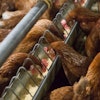Litter is a natural by-product of intensive poultry production, used and ‘disposed’ in huge volumes around the world. Exact composition of poultry litter and frequency of renewal varies from country to country and according to poultry production system. In any case, used poultry litter (poultry waste) has always been a valuable commodity, rich in nutrients and valuable as fertiliser or a renewable fuel in power stations. That is until arrival of H5N1, which now imposes restrictions on poultry litter in storage, prior to use and application/disposal as poultry waste.
New poultry litter stored on farm prior to use, whether in sheds or in plastic covered bales outside, is susceptible to contamination with secretions and faeces from wild birds and rodents unless properly protected. H5N1 and other sub-types of the avian influenza (AI) virus are widely established in the wild bird population, with increasing evidence that rodents, feral cats and even stray dogs may harbour and transmit the viruses.
First indications that improperly stored poultry litter could contribute to the spread of H5N1 came from south-east France in 2006, when the infection that wiped out 11,000 turkeys was thought to have entered poultry houses on litter material contaminated by H5N1-infected faeces from wild waterfowl.
Investigation into biosecurity lapses at the Bernard Matthews turkey farm at Holton in Suffolk, United Kingdom (February 2007), where 159,000 birds died or were culled following infection with H5N1, identified serious failings in the outside storage of poultry litter. Torn plastic covering over the bales would have left openings sufficiently large for access by wild birds and rodents seeking harbourage although the source of infection has not been identified.
Disinfection, safe storage and proper disposal of used poultry litter from farms infected with H5N1 accounts for a large part of the clean-up costs associated with this disease. This was the main reason why clean-up and eradication took longer than anticipated in the most recent Czech Republic outbreaks.
Following the most recent AI outbreak in the United Kingdom, (please see UK poultry breeders lose millions as Bernard Matthews clean up) legislation demanded that poultry litter from sheds and houses was stacked up and composted for 6 weeks (42 days). This was followed by two meticulous cleansing operations conducted at an interval of 7 days. Finally, the houses were left empty and locked up for 21 days.
There were additional issues surrounding disposal of poultry litter from the affected farm because it could not be spread on local farmland as fertiliser. A local power station that was using poultry litter as fuel declined to take consignments from the farm for fear of upsetting other poultry producers who were also supplying the plant.
All sorts of repercussions were felt in the states of Virginia and West Virginia states in the USA after H5N1 antibodies were identified in turkeys on a farm in the Shenandoah Valley (north-western Virginia) in early July 2007. All 54,000 birds were culled and local shows, exhibitions and markets closed for 30 days. According to a report by Hannah Northey at Daily News Record at Harrisonburg in Virginia, poultry litter haulers would be hit even harder. In this case, poultry litter is a combination of wood shavings and bird manure normally processed into fertiliser or spread directly on fields.
Virginia state veterinarian, Richard Wilkes, decreed that poultry litter, manure or bedding could not be taken from poultry houses and spread on the land at any location (or moved from the farm of origin) in 17 counties on the western side of Virginia until30July 2007. The affected farm, not identified for security reasons, was west of Mount Jackson near the border with West Virginia. NeighbouringWest Virginia suspended all poultry shows and sales for 30 days.
According to the Center for Disease Control in Atlanta Georgia, H5N1 is disseminated via avian saliva, nasal secretion and faeces (all present in soiled litter) and can infect healthy birds with which it comes into contact. Poultry litter haulers protested, saying extension of poultry litter/manure/bedding restrictions to other farms where testing had not identified any birds with antibodies was a step too far in biosecurity.
















